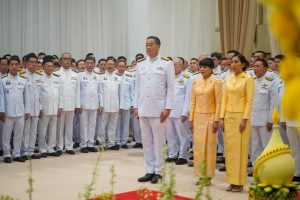After months of suspense, the 61-year-old real estate magnate Srettha Thavisin from the populist Pheu Thai Party has been officially endorsed as Thailand’s 30th prime minister. Srettha, who has virtually no political experience, perhaps faces a tougher task than any Thai prime minister in modern times. Aside from handling mounting economic and social problems, and weathering great power politics, Srettha has to manage competing interests of his coalition partners. The “inter-bloc” 11-party coalition is undoubtedly a peculiar one, comprising 314 MPs from parties from both sides of the polarized political spectrum, including two with direct links to the military: the Palang Pracharath Party (PPRP) and United Thai Nation Party (UTNP).
That Srettha would win the parliamentary support during the vote on August 22 was somewhat predictable, after Pheu Thai dumped its “radical” ex-partner, the Move Forward Party (MFP), to join the old guard, and Pheu Thai’s founding father Thaksin Shinawatra made a dramatic return to Thailand after 17 years in self-exile – just hours before lawmakers began discussing Srettha’s qualifications. Nevertheless, there were some interesting details from the voting session that provide clues to what lies ahead for Thailand’s complex politics.
High Level of Support from Prayut
Out of the elected MPs and military-appointed senators who showed up, 482 voted for Srettha, 165 voted against, and 81 abstained. In comparison, the MFP’s Pita Limjaroenrat only saw 324 votes in his favor, 182 votes against, and a significant abstention rate of 199 during his failed parliamentary bid to become Thailand’s prime minister back in mid-July.
The 482 votes in support of Srettha were noticeably larger than the 375 votes required. And, strikingly, 152 of these votes came from the Senate. Again, as a point of comparison, Pita only won 13 Senate votes.
There are two main camps within the Senate: Team Prayut (associated with former prime minister Gen. Prayut Chan-o-cha) and Team Prawit (controlled by the seemingly more accommodating Gen. Prawit Wongsuwan, leader of the PPRP and Prayut’s old comrade). In the public mind, Team Prawit was expected to back Srettha, yet that did not happen. Prawit ended up skipping the voting session altogether while his friends opted for abstention. Instead, it was the larger-than-anticipated Team Prayut that voted overwhelmingly for Srettha. Prayut’s own brother, Gen. Preecha Chan-o-cha, was no exception.
Such a twist was likely a reflection of cabinet bargaining. Despite the difference in MP size between Prawit’s PPRP (40 MPs) and the Prayut-affiliated UTNP (36 MPs), both parties will reportedly get equal numbers of cabinet posts (two ministers and two deputies). The UTNP will also oversee the high-profile energy ministry.
By appearing to make deals with a longtime nemesis like Pheu Thai, Prayut’s image as an honest ultraconservative leader has been shattered. At the same time, he has shown himself to be the trump card in Thailand’s “Game of Thrones.” All these recent developments suggest that Pheu Thai and the entrenched conservative establishment collectively regard Prayut’s inner circle, not Prawit’s, as an indispensable asset.
Friends to Foes
The majority of votes against Srettha came from the MFP. While this was unsurprising, it probably left Pheu Thai with a bitter taste in its mouth. After all, Pheu Thai firmly supported Pita’s prime ministerial bid and its break-up with the MFP was something done out of necessity. Unless the MFP softens its revolutionary policies, it could forever be stuck in the opposition. Ultimately, as former allies, the MFP could have let Pheu Thai down gently by abstaining instead of saying no outright.
From the MFP’s perspective, however, its alliance with Pheu Thai never felt genuine. Pheu Thai’s fierce attempt to block the MFP candidate from becoming a house speaker was self-explanatory. The remark made by Pheu Thai leader Chonlanan Srikaew on August 22, that joining hands with the MFP “was a mistake,” should erase any remaining doubts about Pheu Thai’s feelings.
All the drama aside, pundits seem to agree that the next election will be a battle between the “neo-conservative” Pheu Thai and the MFP. The narrative of the MFP winning the hearts and minds of Thais increasingly discontented with the current political system and scoring a landslide victory is popular, but whether this can translate into reality remains to be seen. The MFP’s key weakness is its relative lack of tangible achievements. If Pheu Thai’s coalition manages to perform well, especially economically, the tide may turn against the MFP.
Indeed, Srettha’s first mission as prime minister was to engage with business communities in Thailand’s tourism powerhouses, Phuket and Phang-nga. Already recognized as prized jewels, these Andaman provinces will be growing in economic importance as Thailand’s wellness hub.
The Death of the Democrat Party
Notwithstanding the party’s resolution to abstain from the vote on August 22, 16 out of 25 Democrat MPs voted for Srettha. Even more scandalizing was the fact that 12 of these rebel Democrats represent southern constituencies – the party’s traditional strongholds – that have for years fought against Pheu Thai and the Shinawatras’ influence.
In defense of their defiance, the rebels blamed the party’s leadership for failing to issue a definitive resolution, adding that there is no need for young Democrats to “inherit the heritage of hatred and conflicts from people of the old generations.”
The Democrats’ civil war has been going on for some time, but never before has it been exposed to this degree. As things stand, it is only a matter of time before Thailand’s oldest party disintegrates totally.

































